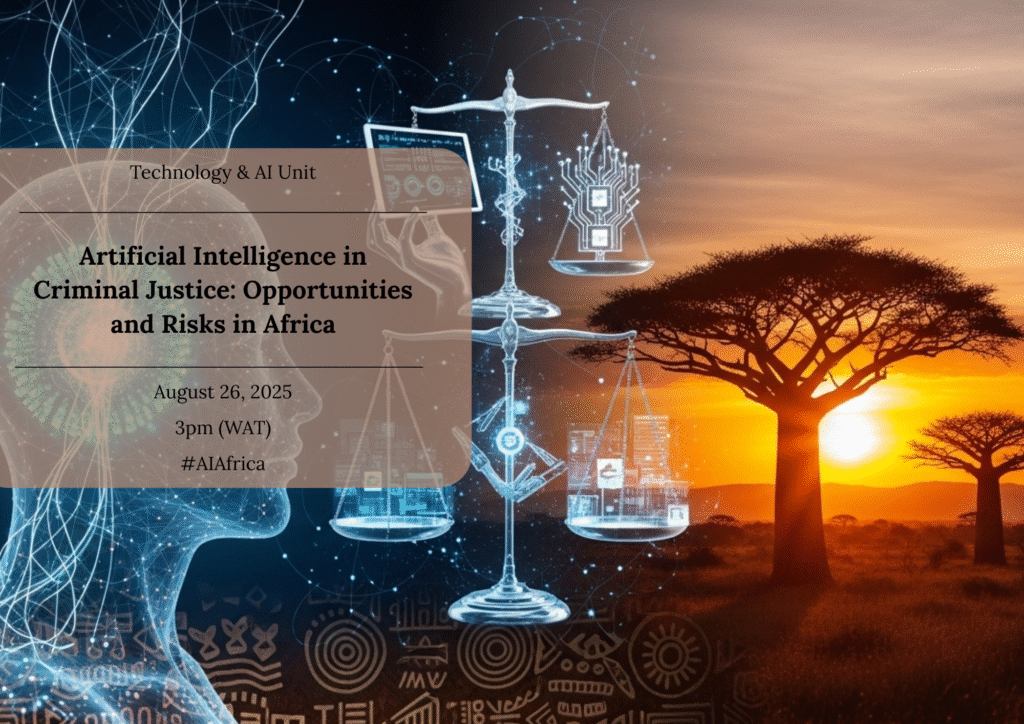The Firdaous Initiative for Academic Excellence hosted a thought-provoking webinar on the theme: “Artificial Intelligence in Criminal Justice: Opportunities and Risks in Africa.” As artificial intelligence continues to reshape industries and societies globally, its integration into the African criminal justice landscape presents a dual-faced reality of profound opportunities and significant ethical challenges. This webinar will convene distinguished experts to dissect the complexities of AI’s role in law enforcement, judicial processes, and legal frameworks across the continent. We aim to foster a critical dialogue among academics, policymakers, legal practitioners, and civil society on navigating this new frontier to ensure that the pursuit of justice is enhanced, not encumbered, by technological innovation.
II. Main Themes and Key Ideas
A. The Inevitability and Ubiquity of AI
- AI is Here to Stay: Speakers consistently emphasised that AI is no longer a futuristic concept but a present reality, impacting every aspect of life, including criminal justice. As Dr. Nfor states, “AI is no longer the future, AI is what it is today and… either we live with it or we die with it.”
- Transformative Potential: AI is seen as a means to make justice systems more efficient, accessible, productive, and effective. It can “announce faster investigations, will reduce case backlogs, drive data insights, and enhance transparency in decision making.”
B. Opportunities and Benefits of AI in African Criminal Justice
- Enhanced Efficiency and Speed: AI can significantly “reduce case backlogs” and “fasten investigation” by automating tasks and analysing large datasets. Examples include digital court recording, e-filing, and electronic case management.
- Improved Crime Prevention and Tracking: AI tools like smart surveillance and predictive policing algorithms can help “track the hard criminals or suspects,” predict crime rates, and enable proactive prevention strategies.
- Data-Driven Insights: AI facilitates the analysis of vast amounts of data to identify patterns and trends, leading to more objective decision-making and better resource allocation.
- Accessibility and Reach: AI can extend the reach of justice to “hard-to-reach areas” and facilitate virtual court sessions, as seen during the COVID-19 pandemic in The Gambia.
- Environmental Crime Enforcement: AI offers unique applications in detecting and prosecuting environmental crimes by analysing satellite imagery, sensor data, and monitoring reports to identify patterns of deforestation, pollution, or illegal fishing. As Miss Nasim explains, “AI is mainly used to analyse large data sets and to identify certain patterns and to provide insights which can then be used as evidence in court.”
C. Risks, Challenges, and Limitations of AI
- Bias and Discrimination: A central concern is that “AI is not neutral, AI reflects the data and assumptions that are fed into it, so this means it can unintentionally perpetuate bias.” Algorithms can misclassify individuals, discriminate based on gender or perceived features, and perpetuate historical biases if not carefully designed and trained on diverse, representative data.
- Human Rights Violations:Privacy: Surveillance tools, especially without informed consent, can “violate rights to privacy.”
- Data Protection: Limited data protection policies and the collection of data without authorisation raise serious concerns.
- Fairness and Equality: Algorithmic bias can lead to “misclassification [where] the innocent [are] to be victimised.”
- Freedom of Expression: Online surveillance by AI could “undermine” freedom of expression by blocking content without a clear justification.
- Presumption of Innocence: Biased AI tools could compromise the impartiality of judicial proceedings.
- Data Quality and Availability: AI requires “high-quality data to produce accurate results.” Africa faces challenges with “limited data,” which can compromise the reliability of AI outputs.
- Lack of Interpretability and Transparency: AI models can be “complex and they can be difficult to interpret,” making it challenging to understand the results and their implications for legal decisions. For evidence to be admissible in court, AI models “have to be transparent and they have to be explainable.”
- Admissibility of AI-Generated Evidence: This is a “developing area of law,” requiring more regulation and expert testimony to ensure reliability and trustworthiness.
- Dependence on Human Intellect: While AI offers significant assistance, it “should not replace human intellect.” Human oversight and critical thinking remain crucial to review and validate AI outputs, especially in complex legal matters.
D. Governing AI: International Standards and Ethical Safeguards for Africa
- Existing International Frameworks: UN General Assembly Resolution (2024): Focuses on “safe, secure, and trustworthy AI systems for sustainable development.”
- UNESCO Recommendation on the Ethics of AI (2021): Establishes a “comprehensive human right-centred ethical baseline,” emphasising human oversight, transparency, accountability, non-discrimination, fairness, privacy, and data governance.
- OECD AI Principles (2019, updated 2024): Soft law principles centred on inclusive growth, human-centred values, fairness, transparency, explainability, robustness, safety, and security.
- EU Artificial Intelligence Act (2024) and Council of Europe Framework Convention on AI (2024): Provide models for robust AI governance, which Africa can learn from.
- African Initiatives: African Union Data Policy Framework (2022): Provides a “continental vision and an array of principles for data governance” and promotes data protection.
- Malabo Convention on Cyber Security and Personal Data Protection (2023): Establishes obligations for personal data protection and cybersecurity, providing a legal basis for regulating sensitive criminal justice data sets and cross-border data flows.
- Essential Ethical Safeguards: Legality, Necessity, and Proportionality: AI use must have a legal basis, be necessary, and proportionate.
- Human Oversight and Contestability: Ensuring “meaningful human control” over AI systems and the ability to challenge their outputs is paramount. As Dr. Yamfo stresses, “the use of AI should not be considered supreme; it should be contested.”
- Non-Discrimination Controls: Mechanisms to ensure accuracy and fairness, preventing bias in AI applications.
- Documentation and Auditability: The ability to scrutinise and audit AI-generated material is vital for reliability.
- Accuracy, Robustness, Security, Transparency, and Vendor Accountability: Core principles for trustworthy AI systems.
E. Recommendations and the Path Forward for Africa
- Contextualised African Approach: A key recommendation is to “not copy and paste what is in the other region but let’s try to learn and now contextualise the AI to suit the African setting.” African diversity, historical background, and socio-cultural nuances must be considered.
- Robust Legal and Policy Frameworks: African states need to develop comprehensive laws and policies that integrate AI components, ensure human rights protection, and address specific challenges.
- Human Rights-Based Approach: AI deployment “should consider a human rights-based approach to balance innovation for development and also for justice in the criminal sector, and at the same time to protect certain basic human rights.”
- Capacity Building and Education: Investing in education and training, particularly in ICT and AI, is crucial for those working in the criminal justice system. Integrating AI into school curricula from a young age is also suggested.
- International Cooperation and Technology Transfer: Leveraging international partnerships for scientific, educational, and technological cooperation can help African states build their AI capabilities and access tools to mitigate risks.
- Sensitisation and Public Awareness: Educating the public on the benefits and risks of AI, especially regarding data privacy and intellectual property, is essential.
- Continued Human Checks: Despite AI’s advancements, “continued human checks to ensure that criminal cases in environmental law are not subject to the errors of AI” are vital. Human intervention is required to minimise errors and inaccuracies.
- Investment in Science and Technology: African leaders must prioritise investment in science and technology education and infrastructure to avoid being left behind in the global AI revolution.
III. Key Facts and Figures
- UN General Assembly Resolution on AI: Adopted in 2024.
- UNESCO Recommendation on the Ethics of AI: Adopted in 2021.
- OECD AI Principles: Adopted in 2019, updated in 2024.
- EU Artificial Intelligence Act: Adopted in 2024.
- Council of Europe Framework Convention on AI: Open for signature on September 5, 2024.
- African Union Data Policy Framework: Endorsed in 2022.
- Malabo Convention on Cyber Security and Personal Data Protection: Entered into force in 2023.
- Examples of AI use in Africa:Rwanda: Digital court recording and judicial visualisations.
- Kenya/Nigeria: E-filing and electronic case management.
- Nigeria: Data forensic capacity using advanced AI.
- The Gambia: Virtual courts during COVID-19.
- South Africa: Smart surveillance (with human rights challenges).
- Egypt: AI surveillance tools for facial recognition for counter-terrorism.
- Morocco: AI piloting in criminal courts for case management.
IV. Conclusion
The webinar conclusively established AI as a powerful, unavoidable force with immense potential to revolutionise criminal justice in Africa. However, this potential is inextricably linked to significant ethical and human rights considerations. The path forward for Africa lies in developing comprehensive, human rights-centred, and culturally contextualised legal and ethical frameworks, fostering local expertise, and engaging in strategic international collaborations, rather than merely adopting foreign models. Only through such a balanced and responsible approach can AI truly serve as an ally to justice and human dignity on the continent.
Webinar Recording
For more information, please contact
Abdullahi Shafii
Head AI & Technology Unit
Firdaous Initiative for Academic Excellence
shafii@firdaouscentre.org


This training will have positive impact on young learners the given an IA and the Advance technology Revolution of the 21th century.
willing to learn on the Topic
I am excited to participate in the webinar as a law student from Starford International University.
my name is Nadar Ahmed and I am student University at Faculty of Law I want to prepare that seminar thnkz
is there any certificate to be given to attendees.?
Yes Certificates of attendance will be issued
I’m very interested to the app